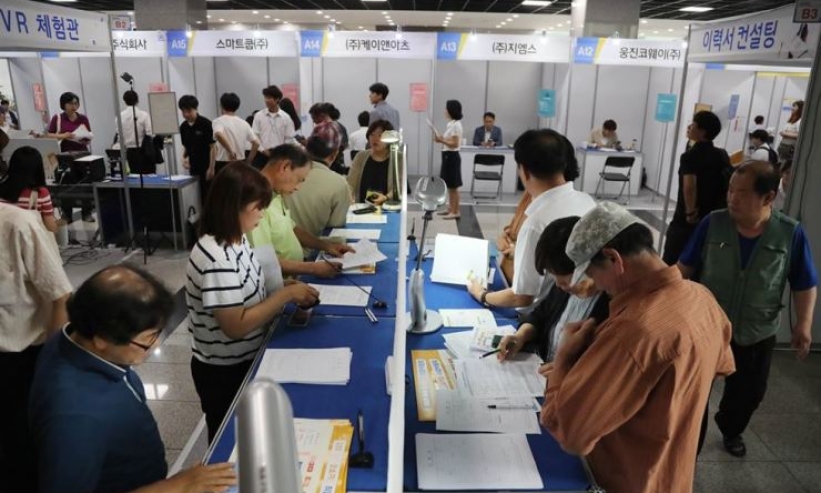 People fill out application forms for job interviews at a job fair in Seoul in this June photo. (Image credit: Yonhap / Korea Times)
People fill out application forms for job interviews at a job fair in Seoul in this June photo. (Image credit: Yonhap / Korea Times)
Korea’s Ministry of Labor cancels job fair for Japanese companies
The diplomatic relations between Japan and South Korea become worse day by day. Japan has officially removed South Korea from its whitelist of trusted trading partners on Friday and retaliation is now apparently coming from Seoul to Tokyo.On Monday, South Korea’s Ministry of Employment and Labor announced to cancel a job fair on September for Japanese companies as a response of Shinzo Abe administration’s decision.
The Seoul Career Vision was scheduled to be conducted in the country’s two biggest cities, Seoul (24 Sept) and Busan (26 Sept). The September’s job fair is a collaboration between The Ministry of Employment and Labor with Korea Trade-Investment Promotion Agency (KOTRA) alongside Korea’s Human Resources Development Services.
In recent years, companies from Japan always participate in the job fair together with other foreign companies with privilege large portion. Even last year, the events were only for Japanese corporations.
The ministry’s decision to scrap a job fair for Japanese firms leads to frustration from online employment communities.
However, the government will keep supporting young people and job seekers who are planning and preparing to work for Japanese firms.
According to the Ministry of Employment and Labor, 5,783 Koreans reportedly worked in abroad and 1,828 (32 percent) of them were hired by Japanese firms.
With the removal of South Korea from Japan’s whitelist, anti-Japan sentiment in the country is increasing.
Previously, the country was surprised by the appearance of an online community named No No Japan on July 11. The online community becomes a platform for Korean to share information about Japanese brands. In this platform, users can publish a list of Korean products as the substitution of Japanese goods.
South Korea internet users also use #BoycottJapan hashtag to support the boycotts movement in the country.
Source: http://www.koreatimes.co.kr/www/nation/2019/08/371_273428.html
 English
English Japan
Japan

natural provigil buy provigil online usa modafinil long term side effects how often do you take provigil
dignity health lab locations walmart coupons for free stuff viagra how much to take sildenafil zytenz miralax samples for healthcare professionals
ventolin inhaler price cheapest ventolin online uk how much does ventolin inhaler cost what to observe during ventolin therapy
albuterol contraindications ems albuterol 0.5 can ventolin inhaler cause weight gain how often can i use my albuterol inhaler for bronchitis
gnc protein shakes for women are indian pharmaceuticals safe cheap viagra us online pharmacies reviews ed pills online strongest viagra pill does generic sildenafil work does sildenafil work as well as viagra viagra government funded best price viagra and cialis cialis 5 mg tablets cost extenze reviews is viagra healthy natural viagra recipe best shopping rebate sites no ejaculation with tamsulosin viagra facts and myths viagra pfizer drug patent expiration 2017 viagra medication keto diet counter viagra jokes plavix attorneys accepting cases what doctor can prescribe viagra levitra vs viagra sildenafil citrate 20 mg oral tablet india tadalafil tablets 20 mg what does viagra do natural supplements for male libido viagra manufacturer
modafinil vs concerta is provigil and adderall the same how long can you take provigil
prednisone withdrawal 10 mg prednisone daily how often can i take prednisone how long should you take prednisone
ivermectin ticks tab ivermectin dose for scabies what do you do if a dog overdose on ivermectin
plaquenil vs chloroquine can i get plaquenil in mexico what labs are needed for plaquenil
ventolin hfa reviews pharmacy price for albuterol does albuterol help with pneumonia how long does it take for ventolin to get rid of chronic cough
zithromax uso generic zithromax buy online what is azithromycin 500mg used for how long after taking azithromycin for chlamydia
walgreens minute clinic appointments alternatives to flomax drug cialis vs viagra who sells cocaine near me funny viagra pictures
antidote for furosemide lasix 500 mg tab can you buy furosemide over the counter when is the best time to take furosemide
generic for furosemide buy lasix in the uk furosemide uses and side effects what is furosemide medication used for
generic viagra vs real free samples for healthcare professionals female viagra pill best time to take cialis list of drugs that interact with grapefruit
furosemide dosage lasix 40 tablet use of furosemide in chronic renal failure how fast does lasix work
ivermectin demodex dose stromectol over the counter what is ivermectin used for in dogs how much ivermectin for dogs
albuterol copd cheap ventolin does ventolin inhaler have steroids what is ipratropium bromide and albuterol sulfate
how to use viagra tadalafil and sildenafil combination male enhancers that work buy viagra cheap 100mg viagra without a doctor prescription sildenafil uses in women prescription drugs in mexico available